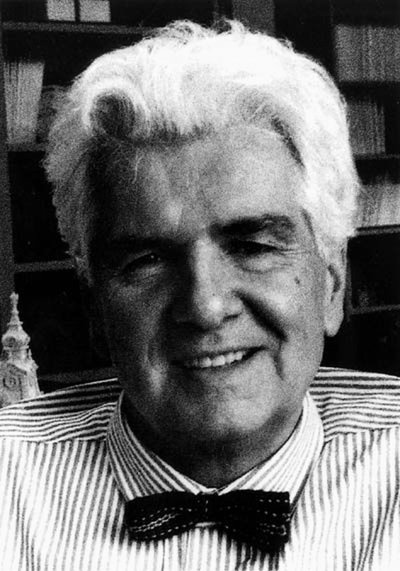October 18, 2001
1999 Nobel laureate to present Neurath Lecture
Nobel Laureate Günter Blobel, John D. Rockefeller Jr. professor and Howard Hughes Medical Institute investigator at the Rockefeller University, New York City, will present the 18th annual Hans Neurath Lecture next week for the Department of Biochemistry.
He will speak on “Protein Targeting” at 3:30 p.m., Thursday, Oct. 25, in Hogness Auditorium at the Health Sciences Center. The lecture is open to everyone.
Blobel won the Nobel Prize in Physiology or Medicine in 1999 for his studies of how newly formed proteins are distributed within cells or cell membranes, or are secreted outside the cell. He discovered that these newly synthesized proteins have a signal sequence within themselves that functions as a kind of molecular zip code. These signal sequences, often only a few amino acids long, are found in almost all newly synthesized proteins in yeast, plant and animal cells that must pass through or lodge within membranes.
Although the signal sequence may be short, the process of localizing proteins within and outside of cells is complex. For example, to be secreted, a protein must go through the endoplasmic reticulum membrane, pass through the Golgi apparatus, and be released outside the cell by fusion of a membrane-bound vesicle with the plasma membrane.
Blobel, who was born in 1936 in an area of eastern Germany that is now part of Poland, earned a degree in medicine in the former West Germany before coming to the United States in 1962. He received a fellowship to study with Dr. Van R. Potter at the University of Wisconsin and earned his Ph.D. there in oncology in 1967. From 1967 to 1969, he was a postdoctoral fellow with Dr. George Palade at Rockefeller University, and then joined the faculty there. He became a full professor in 1976, was named an investigator for the Howard Hughes Medical Institute in 1986, and became John D. Rockefeller Jr. professor in 1992.
Blobel received several international prizes in science and medicine before he was awarded the Nobel, including the Gairdner Foundation Award in 1982, the V.D. Mattia Award in 1986, the Louisa Gross Horwitz Prize in 1987, the Albert Lasker Basic Medical Research Award in 1993, the King Faisal International Prize for Science in 1996 and the Massry Prize in 1999.
He donated the full amount of his Nobel Prize, approximately $1 million, to Friends of Dresden, a charitable organization he founded in 1994 to rebuild historic monuments in Dresden, Germany, that were destroyed in the Second World War. As a child, he had seen from a distance the firestorm that swept over Dresden.
The lecture is named for Dr. Hans Neurath, founding chair of the School of Medicine’s Department of Biochemistry, who held that position for 25 years, from 1950 to 1975. Neurath, who will be 92 this month, is now professor emeritus of biochemistry. He is best known for his pioneering studies of the proteolytic enzymes of the pancreas.



